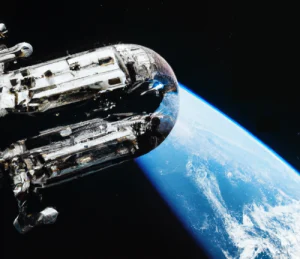Soaring to New Heights
How AI Transforms Space Travel and Unveils the Universe's Mysteries
 As we delve deeper into the 21st century, artificial intelligence (AI) continues to revolutionize various aspects of our lives, including the way we investigate and comprehend our universe. Within the next two years, AI promises to reshape space travel and exploration, transforming spacecraft navigation, astronaut assistance, deep space voyages, and even the search for extraterrestrial life.
As we delve deeper into the 21st century, artificial intelligence (AI) continues to revolutionize various aspects of our lives, including the way we investigate and comprehend our universe. Within the next two years, AI promises to reshape space travel and exploration, transforming spacecraft navigation, astronaut assistance, deep space voyages, and even the search for extraterrestrial life.
In this article, we will explore the potential effects of cutting-edge AI trends on space travel, discuss the challenges and opportunities that lie ahead, and offer predictions about how AI will alter our understanding of the cosmos in the near future.
AI’s Revolution in Space Travel and Exploration
Artificial intelligence is set to significantly expand our capacity to explore the universe. In spacecraft navigation, AI algorithms can rapidly analyze and process enormous volumes of data, enabling self-governing decision-making and trajectory adjustments in response to unexpected obstacles or shifting conditions. This enhanced navigational prowess may open the door to more daring missions and the possibility of venturing into uncharted territories. AI also plays an essential role in astronaut support, with smart systems monitoring crew members’ health and well-being and aiding in mission-critical tasks. Moreover, AI’s potential in deep space exploration is astounding, as it can parse immense quantities of astronomical data to detect patterns and anomalies, potentially leading to the discovery of new celestial objects or even indications of extraterrestrial life.
Tackling Challenges and Seizing Opportunities in AI-Enabled Space Exploration
Integrating AI into space travel comes with its share of challenges. Ensuring AI systems’ reliability and safety under the harsh conditions of space is of utmost importance. Additionally, addressing potential communication delays between Earth-based AI systems and spacecraft in deep space poses a significant challenge. Nonetheless, these challenges also present exciting opportunities. AI-powered space exploration can hasten scientific discoveries and offer valuable insights into the universe’s origins. Moreover, AI technologies developed for space travel can create positive ripple effects in terrestrial industries, such as self-driving vehicles, robotics, and advanced data analysis.
AI’s Power to Unveil the Universe’s Secrets
In the next two years, AI’s growing presence in space exploration has the potential to transform our understanding of the cosmos. As AI technologies become increasingly sophisticated, they will empower us to venture farther and deeper into space, uncovering new secrets of the universe and perhaps even finding evidence of life beyond Earth. AI’s capacity to process and analyze vast data sets from deep space missions will also result in a more comprehensive understanding of cosmic phenomena, allowing us to refine our models of the universe’s formation and evolution. As we continue to push the boundaries of AI and space exploration, our perception of humanity’s place within the cosmos will undoubtedly evolve.
Conclusion
The fusion of artificial intelligence and space travel and exploration is set to be a game-changing force in the coming years, ushering in new challenges, opportunities, and discoveries. By harnessing AI’s unrivaled analytical capabilities and adaptability, we stand on the cusp of a new era in space exploration—one that will redefine our understanding of the universe and our role within it.
